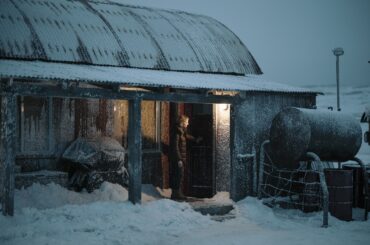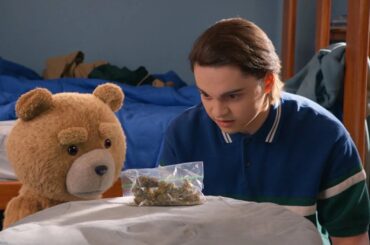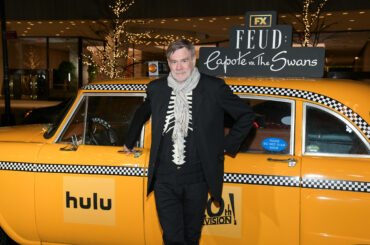Danny Kortchmar, Leland Sklar, Waddy Wachtel, Steve Postel, Russ Kunkel in IMMEDIATE FAMILY, a Magnolia Pictures release. Photo courtesy of Magnolia Pictures.
Denny Tedesco, who’s the filmmaker behind the celebrated documentary The Wrecking Crew, has a new film, Immediate Family, now available on all formats following a successful festival fun and theatrical dates. Immediate Family chronicles the fertile time of 1970s music featuring some of the most iconic stars of that era. Interestingly this film is not about those legends but the legendary musicians that supported them - collectively: Danny Kortchmar, Leland Sklar, Russ Kunkel, and Waddy Wachtel who contributed to some of the most famous songs in recording history that audiences still revere today.
This documentary is an insider’s look at these talented session players in an intimate behind-the-scenes way so that you feel emotionally connected to the subjects. The narrative follows them concurrently present day while prepping for a big concert and showing their history, told through interviews with the icons they supported. The film boasts exclusive interviews with Carole King, James Taylor, Linda Ronstadt, Keith Richards, Don Henley, Stevie Nicks, David Crosby, Jackson Browne, Lyle Lovett, Neil Young and Phil Collins.
Filmmaker Tedesco recently did a Zoom interview with Immersive after his film’s home video release. The conversation has been edited for clarity.
How did the idea for this come about and how long did it take?
My producers brought it to me and it sounded fascinating. It started with Leland Sklar then Russ Kunkel, Danny Komar and I knew their names. They are giants. Leland, I had met a few times. I pitched them the documentary idea, and my thoughts on what we were going to do the next day. They said yes, and the next day, that same day, they said, “Carole King could be interviewed in three weeks.” So there was no prep time. It was right into it.
Carol King, James Taylor, Danny Kortchmar in IMMEDIATE FAMILY, a Magnolia Pictures release. Photo courtesy of Magnolia Pictures.
Did you have funding?
We still had to raise money and stuff, but we got going and within six months by December, I had Carole King, Jackson Brown, James Taylor, Phil Collins, Linda Ronstadt, and a few more in the can. There was no gatekeeper here. They’d make a call. It was like, yeah. When it was that, I mean, Linda Ronstadt at this point, her film is coming out and she’s very fragile at that point, but we were the only interview she was doing. So we drove up to San Francisco for people like Don Henley and David Crosby not known for, or Neil Young, not known for giving interviews, also Keith Richards.
The Laurel Canyon scene is interesting, you have all these musicians, and it’s kind of jaw-dropping how many famous songs came from these guys. At what point did you realize how big this was?
I still had to do my research, even though I’m from that era, but there were albums that I didn’t listen to and I would go, oh God, I didn’t know they were on that. A great example was Andrew Gold, Lonely Boy - wasn’t a big fan years ago when I was with that song, but I fell in love with that song, and that song, that solo of Waddy’s kills me. I was more into the jazz thing as well.
So the interviews, it sounds like it happened pretty fast. Was there anyone difficult to get?
The difficulty came because we had all those people by January 2020, and guess what happened? Everything comes down. Now I’m in a panic. I don’t have the guys in the film yet. I’m making a film about 70-year-olds. And now we have to go slowly out with COVID going at that.
We all waited, and then we slowly started going out. The three of us would go back out and start doing the interviews with the guys, and we did it safely. That’s why Neil Young is on Zoom, and Stevie Nicks is on Zoom because there was no other way to do it and it’s not my favorite, but in the end, it’s really about the message.
How did it come about with licensing all the music?
Well, obviously when you have James Taylor and Carole King, nothing’s for free. We didn’t want anything for free, but still, some of those artists had to give their blessing, and with Jackson, James, and Carol, that was not a problem.
It was only with the labels, everybody wants to always shit on the labels in the music business. They’re there to make money for their artist and themselves and all that and I was a hundred percent behind it because my father was a musician.
Russ Kunkel, Waddy Wachtel, Leland Sklar in IMMEDIATE FAMILY, a Magnolia Pictures release. Photo courtesy of Magnolia Pictures.
Anything you couldn’t get?
We had one song, one song, which bummed me out, was Hurt So Bad, a Linda Ronstadt song. It had nothing to do with Linda, and it’s a great song, and Danny has a solo on it, and the label said yes, and the major publisher said yes. And we had one minor publisher that had 35% who wanted a couple thousand dollars more. Well, if it’s on most favorite nations, and you got over 80 songs, we’re just talking almost close to over 200,000 because you give it to the publisher, you got to give it to the label.
How many songs did you have in the movie exactly?
I think there are 85, It is funny because people, yeah, it doesn’t matter if you have the money, it does add up very quickly. I mean, I got some great rates; they’ll try to work for you.
Did you have multiple camera people or did you have one person?
I had a few camera people, and then Benjamin Ramirez, somebody I was working with, he was shooting with me, and I’ve known him since he was a baby, literally like four years old. And we would go out, Benjamin and I would go out with our Sal Re and that was when no one wanted to go out, and so we just slowly kept going.
The biggest shoot I had was the roundtable. We had a guy named Gary Hatfield shot that, and we did four cameras on that, and we had all four cameras on dollies, and we would just basically circle the table, and we did that at A&M records.
Waddy Wachtel in IMMEDIATE FAMILY, a Magnolia Pictures release. Photo courtesy of Magnolia Pictures.
How much footage did you have once editing began?
We probably started cutting the summer of 2020 little by little, and it was not as much footage as we would’ve had. We would’ve shot more. There were things that just didn’t happen, which was okay. So in the end, it was the original movie. My idea was going to be called Immediate Family and Friends. And what I wanted to do is not just talk about these five guys, but talk about the other part of the business.
What was the discovery phase when you were looking for clips of things? What were the eureka moments and was there a piece of footage that you couldn’t get?
I was able to find concert footage of these people, their first concert in 1971 on the BBC with James, Leland, Russ, and Carol. I know there’s something else out there, but are people or your researchers, they dig deep and they know where they’re looking, but you got to keep on looking and hopefully, someone will find something else. There are also photographers, thank god they had so many photos and so many other photos, there was so much of that that we didn’t have in the sixties.
How did the release go?
It was at the Woodstock Film Festival, and we got an audience award. We had three festivals that weekend, and we got two out of three audience awards. We showed it at 18 festivals. I love watching audiences. It’s watching the audience as you realize the impact that these guys had. It’s not my filmmaking, it’s the music, it’s them.
I’ve seen people with tears in their eyes because every song is a bookmark in someone’s life, and sometimes there are memories. People relate to these things is they relate. They’re not superstars. I want to know if Leland was a geek when he was seven years old, or if they have their hardships. One of the great moments for me, when there’s that hug between Leland and Phil Collins, that is the most true, beautiful hug.
To learn more about Immediate Family and where to watch it, click here.





